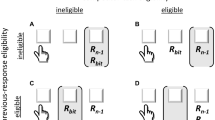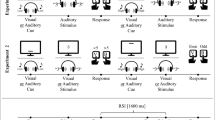Abstract
This research examines whether we have a tendency to repeat mental processes leading to decisions or judgements that are not accompanied by overt behaviours. We adapted the task-switching paradigm so that on selected trials task processing would be terminated prior to response execution. Switch costs were present subsequent to trials where task processing was terminated either at the stage of response selection or at the earlier stage of making a covert judgement (a mental decision) about the target stimulus. These costs were residual, as they occurred despite long preparation intervals, and they did not result from cue-switching or feature-repetition effects. We conclude that the same type of control mechanism may be recruited to select between potential alternative tasks whenever a stimulus needs to be processed in a task-specific way, regardless of whether or not an overt response is required.

Similar content being viewed by others
References
Allport, A., Styles, E. A., & Hsieh, S. (1994). Shifting intentional set: Exploring the dynamic control of tasks. In C. Umlita & M. Moscovitch (Eds.), Attention and performance XV (pp. 421–452). Cambridge: MIT Press.
Allport, A., & Wylie, G. R. (1999). Task-switching: Positive and negative priming of task-set. In G. W. Humphreys, J. Duncan, & A. Treisman (Eds.), Attention, space and action: Studies in cognitive neuroscience (pp. 273–296). Oxford: Oxford University Press.
Allport, A., & Wylie, G. R. (2000). Task switching, stimulus-response bindings and negative priming. In S. Monsell & J. Driver (Eds.), Control of cognitive processes: Attention and performance XVIII (pp. 35–70). Cambridge: MIT Press.
Altmann, E. M. (2004). The preparation effect in task switching: Carryover of SOA. Memory and Cognition, 32(1), 153–163.
Astle, D. E., Jackson, G. M., & Swainson, R. (2006). Dissociating neural indices of dynamic cognitive control in advance task-set preparation: An ERP study of task switching. Brain Research, 1125, 94–103.
Astle, D. E., Jackson, G. M., & Swainson, R. (2012). Two measures of task-specific inhibition. Quarterly Journal of Experimental Psychology, 2006, 1–251.
Bertelson, P. (1965). Serial choice reaction-time as a function of response versus signal-and-response repetition. Nature, 206, 217–218.
Brass, M., & von Cramon, D. Y. (2004). Decomposing components of task preparation with functional magnetic resonance imaging. Journal of Cognitive Neuroscience, 16(4), 609–620.
de Jong, R. (2000). An intention-activation account of residual switch costs. In S. Monsell & J. Driver (Eds.), Control of cognitive processes: Attention and performance XVIII (pp. 357–376). Cambridge: MIT Press.
Hübner, M., Kluwe, R. H., Luna-Rodriquez, A., & Peters, A. (2004). Response selection difficulty and asymmetrical costs of switching between tasks and stimuli: No evidence for an exogenous component of task-set reconfiguration. Journal of Experimental Psychology: Human Perception and Performance, 30(6), 1043–1063.
Kühn, S., & Brass, M. (2010). The cognitive representation of intending not to act: Evidence for specific non-action-effect binding. Cognition, 117(1), 9–16.
Kühn, S., Elsner, B., Prinz, W., & Brass, M. (2009). Busy doing nothing: Evidence for nonaction—effect binding. Psychonomic Bulletin & Review, 16(3), 542–549.
Lenartowicz, A., Yeung, N., & Cohen, J. D. (2011). No-go trials can modulate switch cost by interfering with effects of task preparation. Psychological Research, 75(1), 66–76.
Logan, G. D., & Bundesen, C. (2003). Clever homunculus: Is there an endogenous act of control in the explicit task-cuing procedure? Journal of Experimental Psychology: Human Perception and Performance, 29(3), 575–599.
Mayr, U., & Keele, S. W. (2000). Changing internal constraints on action: The role of backward inhibition. Journal of Experimental Psychology: General, 129(1), 4–26.
Meiran, N. (2000). Reconfiguration of stimulus task sets and response task sets during task switching. In S. Monsell & J. Driver (Eds.), Control of cognitive processes: Attention and performance XVIII (pp. 377–399). Cambridge: MIT Press.
Monsell, S. (2003). Task switching. Trends in Cognitive Sciences, 7(3), 134–140.
Pashler, H., & Baylis, G. (1991). Procedural learning 2: Intertrial repetition effects in speeded-choice tasks. Journal of Experimental Psychology. Learning, Memory, and Cognition, 17, 33–48.
Philipp, A. M., Jolicoeur, P., Falkenstein, M., & Koch, I. (2007). Response selection and response execution in task switching: Evidence from a go-signal paradigm. Journal of Experimental Psychology. Learning, Memory, and Cognition, 33(6), 1062–1075.
Rogers, R. D., & Monsell, S. (1995). Costs of a predictable switch between simple cognitive tasks. Journal of Experimental Psychology: General, 124, 207–231.
Rubinstein, J. S., Meyer, D. E., & Evans, J. E. (2001). Executive control of cognitive processes in task switching. Journal of Experimental Psychology: Human Perception and Performance, 27(4), 763–797.
Schuch, S., & Koch, I. (2003). The role of response selection for inhibition of task sets in task shifting. Journal of Experimental Psychology: Human Perception and Performance, 29(1), 92–105.
Sohn, M. H., Ursu, S., Anderson, J. R., Stenger, V. A., & Carter, C. S. (2000). The role of prefrontal cortex and posterior parietal cortex in task-switching. Proceedings of the National Academy of Sciences, 97(24), 13448–13453.
Steinhauser, M. (2010). How to correct a task error: Task-switch effects following different types of error correction. Journal of Experimental Psychology. Learning, Memory, and Cognition, 36(4), 1028–1035.
Steinhauser, M., & Hübner, R. (2006). Response-based strengthening in task shifting: Evidence from shift effects produced by errors. Journal of Experimental Psychology: Human Perception and Performance, 32(3), 517–534.
Verbruggen, F., Liefooghe, B., & Vandierendonck, A. (2006). Selective stopping in task switching: The role of response selection and response execution. Experimental Psychology, 53(1), 48–57.
Verbruggen, F., Liefooghe, B., Vandierendonck, A., & Demanet, J. (2007). Short cue presentations encourage advance task preparation: A recipe to diminish the residual switch cost. Journal of Experimental Psychology. Learning, Memory, and Cognition, 33(2), 342–356.
Acknowledgments
The authors would like to thank Steve Harley, Julie Main, Sindre Henriksen, Dudu Ozlevent and Maritxu Arlegui-Prieto for their assistance with the data collection. We would like to thank Mike Wendt and an anonymous reviewer for their helpful comments on the manuscript. This work was funded by an Experimental Psychology Society Small Grant.
Author information
Authors and Affiliations
Corresponding author
Rights and permissions
About this article
Cite this article
Swainson, R., Martin, D. Covert judgements are sufficient to trigger subsequent task-switching costs. Psychological Research 77, 434–448 (2013). https://doi.org/10.1007/s00426-012-0448-6
Received:
Accepted:
Published:
Issue Date:
DOI: https://doi.org/10.1007/s00426-012-0448-6




